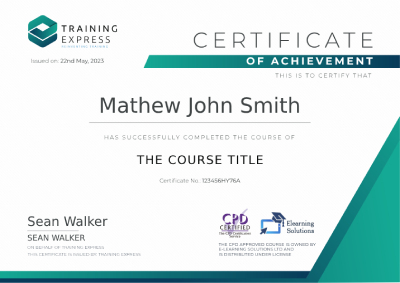GET THIS COURSE AND 1500+ OTHERS FOR ONLY £49 PER YEAR. FIND OUT MORE
16 others bought this course in the last 24 hours!
Community Support Worker Course teaches you everything on the topic thoroughly from scratch so you can achieve a professional certificate for free to showcase your achievement in professional life. This Community Support Worker Training Course is a comprehensive, instructor-guided course, designed to provide a detailed understanding of the nature of the related sector and your key roles within it.
To become successful in your profession, you must have a specific set of skills to succeed in today’s competitive world. In this in-depth Community Support Worker Training course, you will develop the most in-demand skills to kickstart your career, as well as upgrade your existing knowledge & skills. The training materials of this course are available online for you to learn at your own pace and fast-track your career with ease.
Key Features of the Community Support Worker Online Course
Our trusted, high quality and affordable Community Support Worker Online Course trains individuals to become experts in their field.
- Accredited by CPD
- Instant e-certificate and hard copy dispatch by next working day
- Fully online, interactive course with audio voiceover
- Developed by qualified professionals in the field
- Self-paced learning and laptop, tablet, smartphone-friendly
- 24/7 Learning Assistance
- Discounts on bulk purchases
Sneak Peek of The Community Support Worker Course
Who Should Take The Community Support Worker Course
Anyone with a knack for learning new skills can take this Community Support Worker Course. While this comprehensive training is popular for preparing people for job opportunities in the relevant fields, it also helps to advance your career for promotions.
Accreditation
All of our courses, including this Community Support Worker Online course, are fully accredited, providing you with up-to-date skills and knowledge and helping you to become more competent and effective in your chosen field.
Assessment
At the end of the Community Support Worker Course, there will be an online assessment, which you will need to pass to complete the course. Answers are marked instantly and automatically, allowing you to know straight away whether you have passed. If you haven’t, there’s no limit on the number of times you can take the final exam. All this is included in the one-time fee you paid for the course itself.
Certification
Once you’ve successfully completed your Community Support Worker Online Course, you will immediately be sent a digital certificate. Also, you can have your printed certificate delivered by post (shipping cost £3.99). Our certifications have no expiry dates, although we do recommend that you renew them every 12 months.

Course Curriculum
The detailed curriculum outline of our Community Support Worker course is as follows:
- Definition of Mental Health Support Worker
- Duties & Responsibilities of a Mental Health Support Worker
- Qualities of A Great Support Worker
- Why become a Mental Health Support Worker?
- Experience And Qualifications
- Salary & Working Hours
- Code of Conduct
- Summary/Keynotes of the Module
- Assessment
- What are Community Mental Health Teams (CMHTs)?
- Who makes up a CMHT?
- Referral to CMHT
- Procedures after the Referral
- Care Programme Approach (CPA)
- Discharge from the CMHT
- Issues with CMHT
- Confidentiality
- What can I Expect as a Support Worker, Friend or Relative?
- Summary/Keynotes of The Module
- Assessment
- Who is a Service User?
- What does Involving Service User mean?
- Benefits of Service User Involvement
- Methods for Involving Patients )
- Focus groups
- Patient as Teacher
- Patient shadowing
- Patient diaries
- Discovery interviews
- Improving Practice Questionnaire (IPQ) and Critical Friends Groups (CFGs)
- Importance of Service User Involvement
- Summary/Keynotes of The Module
- Assessment
- Necessity of Communication in Health and Social Care
- Communication in the context of Caregiving
- One-to-one communication
- Group Communication
- Informal Communication
- Formal Communication
- Communication between colleagues
- Communication between professional people and people using services
- Communication with professionals
- Multi-agency working
- Multi-professional working
- Degrees of formality in different contexts
- Forms of Communication
- Types of interpersonal interaction
- Speech/Verbal Communication
- Non-verbal communication
- Communication and language needs and preferences
- British Sign Language
- Makaton
- Braille
- Use of signs and symbols
- Written communication
- Pictures and objects of reference
- Fingerspelling
- Communication passports
- Technological aids to communication
- Human aids to communication
- Variation between cultures
- Building Rapport
- Environmental factors that influence communication
- Barriers to communication
- Barriers associated with personality, self-esteem, anxiety and depression
- Barriers associated with aggression and submissiveness
- Barriers associated with assumptions
- Barriers associated with values and belief systems
- Barriers associated with cultural variation
- Use and abuse of power
- Barriers associated with the effects of alcohol/drugs
- Strategies for overcoming communication barrier
- Summary
- What is Health and Social Care?
- Healthcare Overview
- Who provides Healthcare?
- Social care overview
- Social care needs assessment
- What is a social care need assessment?
- When must the local authority assess?
- Who provides social care?
- Healthcare vs Social Care
- Why is the health and social carer a valuable career?
- Summary
- Role of Health and Social Care Workers
- Additional Duties of Health and Social Care Workers
- Can carers be charged for support?
- Ways to Improve Quality of Service
- Information Sources
- Any Research Should Have
- Reliability
- Validity
- Types of Research
- Media
- People in same profession
- Conferences
- Any Research Should Have
- Reflective Practice
- Reflection on Practice
- Reflective in Practice
- How it is done
- Uses of reflective practice
- Development
- Professional Development
- Personal Development
- Relationships and Personal Development
- How to evaluate your own performance
- Reflective writing
- Training
- Planning our Personal Development
- Effects of Learning on Development
- What are your rights as a carer?
- What social care rights do I have as a carer?
- What is a carer’s assessment?
- What are the eligibility criteria for carers?
- What happens if you are found to have eligible needs?
- Conflicting Rights and Responsibilities
- Clash of Rights
- Conflict between rights and responsibility
- Safety vs privacy
- Safety vs equality
- Job responsibility vs right to private life
- Responsibility to others vs right to choose
- Summary
- Understand concepts of equality, diversity and rights in relation to health and social care
- The benefits of diversity
- Social and Cultural benefits of diversity
- The economic benefits of diversity
- Health and social care settings
- Residential care
- Day-care
- Nursing care
- Domiciliary care
- Active promotion of equality and individual rights
- The principles of the care value base
- Promoting the rights, choices and well-being of individuals
- Anti-discriminatory practise – empowering individuals
- Individual rights
- The right to be respected
- The right to be treated equally and not discriminated against
- The right to be treated as an individual
- The right to be treated in a dignified way
- The right to be allowed privacy
- The right to be protected from danger and harm
- The right to be allowed access to information about themselves
- The right to able to communicate using their preferred methods of communication and language
- The right to have their choices taken into account and be protected
- Discriminatory practices in health and social care
- Bases of discrimination
- Culture
- Disability
- Age
- social class
- gender
- sexuality
- health status
- family status
- cognitive ability
- Discriminatory practice
- Bases of discrimination
- The effects of discriminatory practice in health and social care
- Marginalisation (treat a person or group as insignificant)
- Disempowerment (make a person or group less powerful or confident)
- Low self-esteem and self-identity
- Restricted opportunities
- Negative behaviours such as aggression or criminality
- How anti-discriminatory practise is promoted in health and social care settings
- The active promotion of anti-discriminatory practise
- Ethical principles
- Putting the individual at the heart of service provision
- Providing active support consistent with the beliefs, culture and preferences of the individual
- Mental health support – coping strategies
- Supporting individuals to express their needs and preferences
- Promoting individuals’ rights, choices and well-being
- Balancing individual rights with the rights of others
- The active promotion of anti-discriminatory practise
- Personal beliefs and value systems
- Influences on culture
- Influences on beliefs
- Past events
- Socialisation
- Environmental influences
- Health and well-being
- Developing greater self-awareness and tolerance of differences
- Committing to the care value base
- Careful use of language
- Working within legal, ethical and policy guidelines
- Summary
- What Does a Youth Worker Do?
- The Foundation of Youth Work
- Youth Workers Competence
- Summary
- Assessment
- Youth Work Practice
- Practice in Different Settings
- Youth Development Work as a Profession
- Summary
- Assessment
- A Unique Profession
- Selecting a Career in Social Work
- Education and the Social Work Career Ladder
- Employment Opportunities
- Salary and Demand for Social Worker
- Summary
- Assessment
- Social Change in Youth Development Work
- Social Change Can Occur on Three Levels:
- policy change
- changes in social relations
- political action.
- Paulo Freire and social change
- Applying Freire’s ideas
- Summary
- Assessment
- Safeguarding
- Who are vulnerable individuals?
- Dealing with safeguarding issues
- What Is Abuse?
- Types and Signs of Abuse
- Types of Abuse
- Signs of Different Types of Abuse
- Adults, Young People and Children at Risk from Abuse
- Environmental factors that may make abuse more likely
- Care services with institutional practices
- Adults and children residing in health and social care settings
- Health services
- Independent living facilities
- Homelessness
- How to Deal with Suspected Cause of Abuse and Disclosure of Abuse
- People who might suspect or be told about abuse
- Peers
- Family
- Siblings
- Teachers
- Social Workers
- Other Professionals
- Other Members of the Public
- Dealing with Disclosures of Abuse and Suspected Abuse
- Duty to Report
- Report Appropriately
- Report Procedures
- Support and Comfort
- Don’t Judge
- Maintain Confidentiality
- Protect Self
- People who might suspect or be told about abuse
- Minimising the Risk of Abuse
- Person-centred planning
- Duty of care
- Effective record keeping
- Following policies and procedures
- Building a trusting professional relationship
- Effective communication channels
- Continuing professional development
- Summary
- History
- Components of the Criminal Justice System
- Law Enforcement
- The Courts
- The Correctional System
- The Juvenile Justice System
- Social Welfare Policy in Criminal Justice
- Conclusion
- The legal responsibility
- Other duties and principles
- Needs
- Basic Needs
- Physical Needs
- Emotional Needs
- Social Needs
- Intellectual Needs
- Conflicts and Dilemma
- Consent for care or for treatment
- Consent Validity
- Capacity
- Voluntary
- Informed
- Ethical Dilemmas and Care Conflicts
- Complaints
- Who gets to make a complaint?
- The complaints process
- Policies in Dealing with Complaints
- Confidentiality
- Equality Policy
- Others
- Summary
- Doctor Patient Confidentiality or Implementation of P.L.R.C
- Health & Social Care Act 2012
- An Overview of the Health & Social Care Act 2012
- Health & Social Care workers Roles and Responsibilities
- Changes made through Health & Social Care Act 2012
- Key Legislative Changes
- Caldicott Principles & Data Protection Act [1998] [2018] updated in accordance with GDPR [2018]
- Caldicott Principles
- The 7 Caldicott principles
- The 8 principles of Data Protection
- Overview of the Data Protection Act 1998
- Overview of the Data Protection Act 2008
- How does the act differ from GDPR?
- Caldicott Principles
- Health & Social Care Act 2012
- Access to the Patient Records Legislations
- Access to Medical Reports Act 1988 (England, Scotland and Wales) & Access to Personal Files and Medical Reports (Northern Ireland) Order
- Summary of the Acts
- Code of Practice
- When Access should be limited or refused
- Aim and Extent of Legislation
- Administrative Duties
- Individuals Right
- Employee’s Right
- Access to Health Records Act 1990 (England, Scotland and Wales)
- Overview of the Act
- Access to Health Records (Northern Ireland) Order 1993
- Overview of the Order
- Access to Medical Reports Act 1988 (England, Scotland and Wales) & Access to Personal Files and Medical Reports (Northern Ireland) Order
- Adult safeguarding and support Legislations
- Adult Support and Protection (Scotland) Act 2007
- Overview of the Act
- Principles underlying the Act
- What safeguards are in place to protect the rights of individuals?
- Care Act 2014 (England)
- Overview of the Act
- Principles of the Act 2014
- Carers Act 2016 (Scotland)
- Overview of the Act
- What will change?
- How will the Carer Act improve the quality of services available?
- Social Services and Well-being (Wales) Act 2014
- Overview of the Act
- Principles of the Act
- Adult Support and Protection (Scotland) Act 2007
- Abortion Legislations
- Abortion Act 1967
- Overview of the Act
- Human Fertilisation and Embryology Act (1990) amended in 2008
- Overview of the Act
- Abortion Act 1967
- Summary
- Mental Capacity & Mental Health Legislations
- Adults with Incapacity (Scotland) Act 2000
- Overview of the Act
- Principles of the Act
- The duties and responsibilities of interveners and guardians
- Adults with Incapacity (Scotland) Act 2000
- Mental Capacity Act 2005 (England and Wales)
- Overview of the Act
- Main key principles
- Code of Practice
- Mental Health Act 1983 amendment 2007
- Overview of the Act
- The five overreaching principles
- The main changes introduced in the 2007
- Mental Health (Care and Treatment) (Scotland) Act 2003 updated in 2015
- Overview of the Act
- Millan principles
- Mental Health (Northern Ireland) Order 1986
- Overview of the Act
- Mental Capacity Act (NI) 2016
- Overview of the Act
- Principles of the Act
- Mental Health (Discrimination) Act 2013
- Overview of the Act
- Drugs Control, Supervision, management & Health Protection Legislations
- The Controlled Drugs (Supervision of Management and Use) Regulations 2013 (England and Scotland); 2009 amended in 2015 (Northern Ireland) & Regulations 2008 (Wales)
- An overview of the Regulations
- General Principles
- Single Operating Model covers
- The Health Protection (Notification) Regulations 2010 (England)
- Overview of the Regulations
- The Public Health (Northern Ireland) Act 1967
- Overview of the act
- Public Health (Scotland) Act 2008
- Overview of the act
- The Health Protection (Notification) (Wales) Regulations 2010
- Overview of the Regulations
- The Controlled Drugs (Supervision of Management and Use) Regulations 2013 (England and Scotland); 2009 amended in 2015 (Northern Ireland) & Regulations 2008 (Wales)
Course Curriculum
 TAKE THIS COURSE
TAKE THIS COURSE
£125.00£20.00 ex VAT- 1 year
- Level 2
- Course Certificate
- 8 hours, 29 minutes Gift this course
Subscribe to this course and 2,000+ top‑rated Training Express courses for your organization.
Try Training Express Business- For teams of 5 or more users
- 2,000+ fresh & in-demand courses
- Learning Engagement tools
- SSO and LMS Integrations
 Food Hygiene
Food Hygiene Health & Safety
Health & Safety Safeguarding
Safeguarding First Aid
First Aid Business Skills
Business Skills Personal Development
Personal Development









